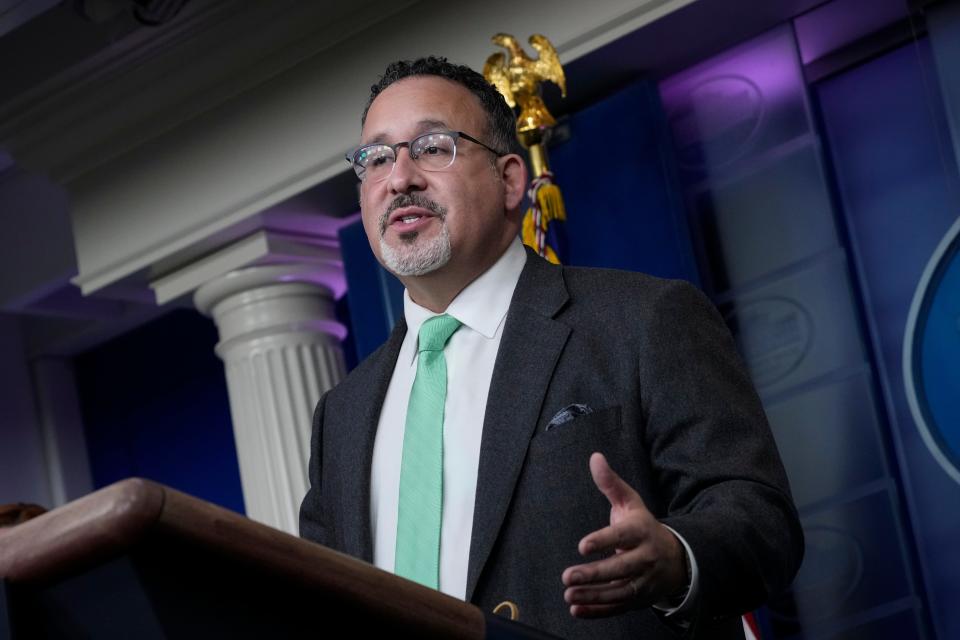Are for-profit colleges worth the cost? Graduates are split on the value of their degrees
Only about 40% of students who attended a for-profit university say their degree was worth the cost, according to new polling shared with USA TODAY.
That sentiment emerges at a time when Americans are broadly questioning the value of a college education. For-profits, however, are often the subject of additional federal scrutiny and criticism because of their recruitment practices and high cost of attendance compared to public schools.
“Compared to public higher education institutions, for-profit colleges have been criticized for being more expensive with similar or worse outcomes for graduates, who tend to be left with higher debt,” reads the report from Public Agenda, a nonpartisan research firm, and funded by Arnold Ventures, a philanthropic organization found by billionaires Laura and John Arnold.
What happens when a college closes? A for-profit closure upended one veteran’s life. Two years later, he’s still rebuilding.
That skepticism is fueled by the high-profile closures of massive college chains like ITT Tech and Corinthian Colleges in the mid-2010s. The federal government also stripped an accreditor associated with for-profit colleges of its authority to approve federal funding last year, one of the few times the federal government has done so in recent memory.
Are for-profit colleges worth the cost?
The survey queried about 600 for-profit students, graduates and dropouts. It also compared responses with 400 community college students.
About two-thirds of for-profit grads said they were optimistic about earning their degree prior to their studies.
According to the survey, 38% of for-profit graduates said the money they paid for their degree was worth the cost, and another 37% said it was not. The remaining quarter said the value of their degree “remains to be seen.”

The survey also found about half of those at proprietary universities borrow, but only 30% of community college students do the same. About 65% of alumni of for-profit institutions said making payments on their student loans was difficult – though payments on federal student loans have been paused for roughly the past three years.
For-profit Stratford University to close: It blames the Education Department for its end
Students at for-profit universities were more likely to learn about their colleges or schools from advertisements. In contrast, those at community colleges were more likely to learn about their institutions from high school guidance counselors.
Why do people go to for-profit colleges?
About 55% said the availability of online classes was one of the most important factors in making their decision. Roughly half of graduates said they wanted a different career altogether, and a quarter said they wanted to get ahead in their jobs.
How to find a good university? A college closed, leaving thousands without a degree. How to keep it from happening to you
Nearly half of those surveyed said college recruiters provide useful information about the college, yet about 40% said they felt pressured to enroll. About 2 in 5 students said recruiters helped them understand “how to apply for financial aid,” while 30% said they were contacted too frequently.
How do for-profit colleges compare with public and private universities?
Based on federal data, these institutions often cost more than public universities, though private nonprofits are often more expensive. However, four-year proprietary universities have graduation rates significantly lower than their private counterparts.
Graduation rates are higher for students seeking degrees or certificates at two-year for-profit institutions in comparison with similar public or private institutions.
Graduates from public four-year institutions graduate with about $26,100 in debt compared with about $29,000 for grads of private universities and $35,700 for nonprofit graduates, according to federal data. However, private school grads leave with more debt in certificate and associate programs relative to public and for-profit universities.
What do for-profit universities think of the findings?
Jason Altmire, head of the for-profit university trade group Career Education Colleges and Universities, said for-profit institutions cater to adult students.
“What we have always argued on the for-profit side is we provide that off-ramp for people who have tried other settings that haven't worked out,” said Altmire, a former Democrat in the House from Pennsylvania. “If they work hard, we can get them their degree quickly.”
Tuition is higher at these institutions, he said, because they typically don’t have large endowments as private universities do, and they don’t receive the same amount of public funding from states. Most universities benefit from government funding in the form of student loans, grants for low-income students and other federal aid.
What happened to free college? Cutting cost of higher ed out of feds' reach
Altmire also pointed to a Gallup study for the trade group that found roughly 60% of graduates of its schools were employed. Additionally, about 50% found a job within six months of graduating, compared with about 30% of graduates with associate degrees.
He noted that skepticism of higher education is rising at public and private universities, not just at for-profit colleges. A 2022 poll from USA TODAY and Public Agenda found only about half of Americans think the value of a college education outweighs the cost.
Contact Chris Quintana at (202) 308-9021 or cquintana@usatoday.com. Follow him on Twitter at @CQuintanadc
This article originally appeared on USA TODAY: Are for-profit colleges worth it? Graduates have conflicting answers


